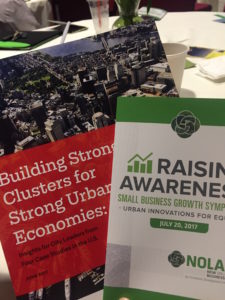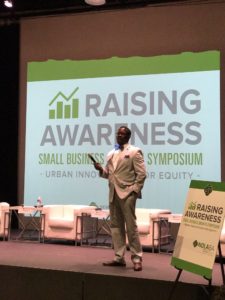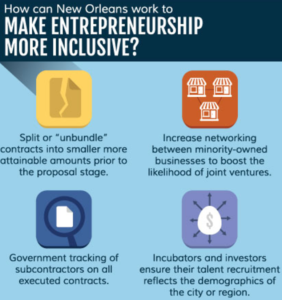Back

Blog
As New Orleans Economy Recovers, Focus Shifts to Growing Inclusive Clusters and Entrepreneurship
Among its devastating effects, Hurricane Katrina had a destructive impact on regional employment. The storm, and its aftermath, eliminated more than 190,000 jobs in New Orleans alone. In the months following the disaster, employment rolls fell precipitously and remained stubbornly low, even as investment in the city began to increase.
Now, over 10 years later, the New Orleans economy is bouncing back, and a focus on clusters and entrepreneurship are some of the major drivers of the city’s post-Katrina growth.
A key catalyst of this recovery began in 2012, when New Orleans developed a comprehensive economic development plan, ProsperityNOLA. The plan aimed to strengthen and diversify the city’s post-Katrina economy and expand economic opportunities for all residents. The planning process was led by the city’s economic development agency, the New Orleans Business Alliance (NOLABA), and included over 200 stakeholders in its process. ICIC played a vital role in laying the groundwork for the plan by identifying priority clusters for generating quality jobs.
 In our most recent report, Building Strong Clusters for Strong Urban Economies, ICIC featured key insights from ProsperityNOLA’s cluster building efforts. In particular, NOLABA’s ProsperityNOLA plan was highlighted for its focus on inclusive clusters that create opportunity for all residents. Today, NOLABA leads the growth of three primary clusters: BioInnovation and Health Services, Creative Digital Media and Retail.
In our most recent report, Building Strong Clusters for Strong Urban Economies, ICIC featured key insights from ProsperityNOLA’s cluster building efforts. In particular, NOLABA’s ProsperityNOLA plan was highlighted for its focus on inclusive clusters that create opportunity for all residents. Today, NOLABA leads the growth of three primary clusters: BioInnovation and Health Services, Creative Digital Media and Retail.
Earlier this week, ICIC was honored to present on some of the actionable insights from this report at NOLABA’s Raising Awareness: Small Business Growth Symposium in New Orleans. The event brought together nearly 60 local business owners, capital providers, nonprofit professionals, and political leaders working to create a vibrant small business ecosystem in New Orleans. ICIC’s Kim Zeuli and Kathleen O’Shea shared some of the major successes and lessons learned from ProsperityNOLA, and highlighted general recommendations for driving high-impact, inclusive cluster growth.

The city’s dedication to cluster-based strategy and small business growth is beginning to pay off. According to research from the Data Center, business creation has increased rapidly in the New Orleans metro area, surpassing the national rate by 64 percent. As the city continues to rebuild, numerous business accelerators and incubators have opened to meet the increased demand from entrepreneurs. Additional business clusters have formed, including a cluster focused around water management, many of which relocated to the area after assisting with recovery efforts. With the existence of this growing cluster, New Orleans has the potential to be the Silicon Valley of coastal restoration, protection and urban water management.
More broadly, there has been an emphasis on growing minority-owned businesses and promoting inclusive economic development. Minority-owned businesses are more likely than other employers to hire minorities and reinvest in their communities, which in turn seeds further local economic growth.
Many new programs are specifically tailored to social entrepreneurs looking to apply a tech-savvy, business-oriented approach to addressing the social challenges that continue to impact the city.
Propeller, which ICIC has previously featured, is one such example. Propeller leverages the grassroots economic activity and latent entrepreneurship, particularly within the African-American community. “We saw people who were regular people…who couldn’t turn their backs on what was happening in their own neighborhood,” explains Propeller co-founder Andrea Chen.
PowerMoves.NOLA, now a national organization, has its roots in the Big Easy. Leslie Jacobs and Earl Robinson founded the organization in 2014 after they were told that finding a high-growth tech startup led by a black woman in New Orleans would be nearly impossible. “I just found that unbelievable,” said Jacobs, a local business leader. So the two set out to create an organization whose mission is simple: to find minority entrepreneurs and help them grow. Nearly 40 entrepreneurs attended their inaugural annual conference, with more than a dozen local startups receiving capital, office space and other resources as a result. PowerMoves.NOLA now offers a range of services, including a fellowship program, for minority entrepreneurs. They also hold conferences in cities across the US, including Oakland, Chicago, Detroit, and Miami.
In partnership with the City of New Orleans and the New Orleans Business Alliance, the Good Work Network, a 501(c)3 nonprofit, is able to provide hands-on technical assistance to small, community based businesses, and serves as the city’s primary provider of business development services. The organization specifically targets minority- and women-owned businesses and provides a range of technical assistance to help these companies launch, grow and succeed.

City and state agencies have also increased efforts to promote supplier diversity and assist minority-owned businesses with procurement.
Increasing access to public-sector contracts is particularly important to women- and minority-owned businesses in New Orleans. The New Orleans Index revealed that while minorities make up 47% of New Orleans’ total population, their businesses received only 2% of all business receipts– a number that has not improved since before Hurricane Katrina, despite the city’s influx of entrepreneurs and programs designed to help them grow.
At the local level, the City of New Orleans has created an Office of Supplier Diversity. The City hosts workshops to help businesses apply for Disadvantaged Business Enterprise (DBE) Certification, build capacity for minority-owned businesses, and to spread information about DBE opportunities. One of the ways the City accomplishes this is through its Small Business Assistance Fund, which matches creditworthy DBEs with products, lenders and intermediaries to help the businesses secure working capital, lines of credit, contract loans and construction mobilization loans.
ProsperityNOLA, and these other examples of public, private, and philanthropic initiatives, show that economic development can come in many forms, and reaffirms an important finding featured throughout ICIC’s research: the stronger the representation of all entrepreneurs in the entrepreneurial ecosystem, the larger and deeper the ecosystem becomes—to the benefit of all.
